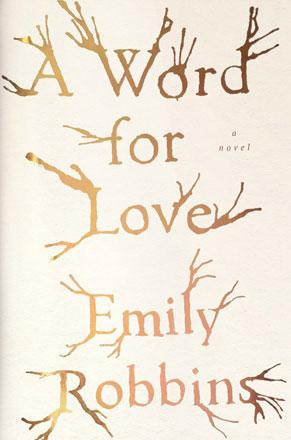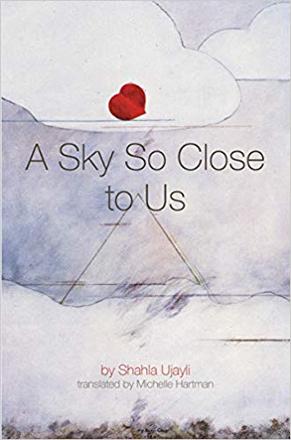You are here
Growing your heart
Feb 26,2017 - Last updated at Feb 26,2017

A Word for Love
Emily Robbins
New York: Riverhead Books, 2016
Pp. 290
This is the story of a great love, and of an American girl who becomes part of an Arab family, but it is quite different from most romances or cross-cultural novels, due to the author’s innovative approach to language: Emily Robbins displays an uncanny ability to expand the meaning of words beyond their dictionary definitions.
Partly inspired by Arabic, which produces many associated words from three-letter stems, she creates a lyrical narrative that makes unusual connections between words, and to the feelings they evoke. This is not just a question of style, but thematic. Besides exploring multiple forms of love, the novel focuses on language and words, and their linkage to behaviour.
“A Word for Love” is set in an unnamed Arab city, easily recognisable as Damascus.
Anyone familiar with the city will find that Robbins’s descriptions ring true. Yet, it is not the famous landmarks that are highlighted. Most of the plot unfolds within the four walls of the apartment of the middle-class Syrian family with whom Bea, the narrator, lives. This is another feature of the novel’s integrated style and theme: Huge human emotions play out in a very compressed space. Love, anger, resentment, jealousy, fear and generosity are expressed in the everyday interaction involved in housework, dress, personal hygiene, meals, child’s play, whispered secrets and shared jokes. If one thinks such things are trivial, think again: Robbins shows how they are related to very basic human values and needs. This is a novel about the beauty of small things.
There are, however, a few outings. Bea visits the National Library, for she is on a mission, having come to Syria to read “the astonishing text”, a particularly lovely rendition of the Qais and Leila love story, which is said to make even scholars cry. Bea wants not only to increase her Arabic proficiency, but to intensify her feelings. Her partner in this latter endeavour is Nisrine, the Indonesian maid of the Syrian family, who wants to “grow her heart”, so she can like her job and get over her homesickness. Making an Asian domestic worker a main character is another element that sets this book apart.
Another outing, which turns out to be fateful, is when the family goes shopping. Just before reaching home, they face a police blockade. Madame, the mother of the family, makes Bea and Nisrine get out of the car and offer the policeman a bag of apples to speed their passage. Adel, the blonde policeman, is smitten by Nisrine, and she, in turn, spies the chance to grow her heart. As the family’s home is right across from the police station, their love blossoms in the space between.
“There is a language that develops in love. When the circumstance is extreme… then so can be the language. Theirs was of epic proportion. They talked with their hands across the street and the garden. He stood on the rooftop, she on the balcony. Because they were far apart, it was a language of large movements”. (p. 89)
“When she was on the balcony and he was far away, then he would raise one arm, and if she raised hers, it felt like the sky could connect them”. (p. 100)
Looking for deeper meaning in the legendary love story of old, Bea finds herself caught up in a contemporary Qais-and-Leila romance. There are many parallels: Adel has a reputation as “a real Qais” and he writes poetry, tossing poems to Nisrine on the balcony wrapped in small plastic bags, or occasionally giving her one when she takes the family’s children to the park by the police station.
The ultimate parallel is that theirs, too, is an impossible love, unacceptable to family and society. By paralleling the two romances, Robbins in effect creates a thematic narrative that spans over a millennium.
Paradoxes and dualities drive the plot to an uncertain conclusion. While Bea is constrained by living in the family, it also gives her a sense of belonging. The greatest paradox, however, is the policeman’s dual role. Adel is Nisrine’s lover and is supposed to protect, but he is the adversary endangering Baba, the father of the family, who has been a political prisoner and risks being one again, as he is involved in the pro-democracy movement. It is 2005, and unrest is mounting in the country. Adding to her ruminations about language and writing, Bea learns that “here writing could be dangerous”. (p. 48)
In this, her first novel, Robbins doesn’t romanticise love, but searches for its function in life. As Bea discovers, love is not something one finds or loses, but a component of one’s being: “In the end, it was something you went to in your most painful moments… It lifted you, helped you to become another person, to know another side of yourself”. (pp. 233-4)
The book is also a meditation on people being trapped in pre-assigned roles, and the unforeseen consequences of trying to break out of them. “A Word for Love” will be available at Books@Cafe where Emily Robbins will have a reading in March.
Sally Bland
Related Articles
The Weight of ParadiseIman HumaydanTranslated by Michelle HartmanMassachusetts: Interlink Books, 2016Pp.
This is a novel that celebrates love, caring, sincerity and intellect, but the opposing forces — intolerance, violence, hypocrisy and ignorance — loom large in the story. Obviously, Saudi author Laila Aljohani is not living in a bubble, but is keenly aware that one is not always rewarded for giving love or sticking to one’s principles. What happens to her beautifully crafted main characters when they fall in love, illustrates the point.
A Sky So Close to UsShahla UjayliTranslated by Michelle HartmanUS: Interlink, 2019, 303 pp. This is a novel that was shortlisted for th














